The frank admission elicited an appreciative smile. “The Bordjias are our allies,” Al’Aif said. “I hope you did not kill many men when you stole them.”
Kadumi shrugged. “No, not many.”
Al’Aif chuckled at the boy’s swagger, then eyed Ruha. “I thought the Mtair Dhafir rid of you.”
“And I of them,” she answered, lifting her chin. “But I return out of duty, not desire, Al’Aif.”
Kadumi frowned at the apparent enmity between the two. “We are all that remains of the Qahtan. We have come to warn your sheikh of the danger that destroyed our tribe.”
Al’Aif raised an eyebrow. “Does this danger have to do with black-robed men and a caravan larger than ten tribes?”
“How did you know?” Ruha and Kadumi asked together.
Al’Aif pointed to the south. “They are camped at the Bitter Well. They have sent two jackals with tongues of sugared water to speak of alliances.” The Mtair gestured at one of Kadumi’s camels, then said, “If you’ll lend me a ride, I’ll take you to camp. I want the sheikh to speak with you as soon as possible.”
Al’Aif led the party to a gulch filled with the drooping, twiggy branches of ghaf trees and lined with tasseled sedges of qassis bushes. The tinkle of a tiny stream rang from the bottom of the draw, and the camels, thirsty from yesterday’s hard ride, bellowed angrily at not being allowed to stop and drink.
As the trio rode into camp, the old women and the children gathered outside their tents. When Ruha passed, many of them hissed and trilled disapprovingly. One little boy even yelled at her to go away.
Kadumi’s outrage showed on his scowling face. “This is a disgrace,” he uttered, addressing Al’Aif. “Do the Mtair Dhafir treat all their guests so wretchedly?”
“They do not mean to offend you,” Ruha said. “Their disdain is for me alone. There is something you should—”
Al’Aif lifted a hand to silence her. “They believe Ruha has shamed the tribe by violating her purdah ,” said the gaunt Mtair. “To them, it looks as if she is returning to her father.”
The older warrior’s words satisfied Kadumi. “Of course,” the boy said, smiling and nodding to the angry women. “I should have realized how her return would look to such an honorable tribe.”
Behind the boy’s back, Ruha raised an eyebrow to Al’Aif. The last thing she had expected him to do was lie on her behalf. The Mtair responded with a quick shrug, then nodded toward her father’s tent and continued forward. Ruha could not guess the meaning of the gaunt warrior’s gesture.
Outside the sheikh’s khreima , they left their camels with a herdboy. Al’Aif entered the tent without announcement, as was the right of any warrior in the Mtair Dhafir. He motioned for Ruha and Kadumi to follow.
Inside, Ruha’s father sat upon a gaily colored ground carpet at the far end of the tent. He was a bony old man with cloudy eyes and a wispy gray beard. Across from him sat a man wearing a black burnoose. Though his face was swaddled in a turban, the cloth had been pulled down to reveal a silky mustache and sharp features. In front of each man sat a small silver cup filled with hot salted coffee.
Behind the stranger stood a second man, this one with skin and hair as pale as white sand. A hooded robe of deep purple hung off his shoulders, and a pair of silver bracers encircled his wrists. He held himself in the humble posture of a servant, but when his flashing blue eyes inspected Ruha and her companions, the widow immediately suspected that this man was more than he wished to seem.
The sheikh and the seated stranger continued speaking in low, muted tones, neither appearing to notice the trio’s presence.
Al’Aif stepped forward. “Sheikh Sabkhat,” he called.
Ruha’s father scowled. Addressing the seated man, he said, “Excuse me, El Zarud.” As the sheikh looked in the trio’s direction, his eyes seemed glazed and vacant. “What?”
Al’Aif pointed at Kadumi and Ruha. “I bring visitors from the Qahtan,” he said. “They have come to warn you about the strangers.”
“Warn me?” the sheikh frowned. “Of what? The Zhentarim are our friends.” He waved a hand to dismiss the trio, then looked back to Zarud with a smile.
Kadumi’s jaw dropped, and he seemed too surprised at the sheikh’s rudeness to speak.
The gaunt Mtair turned to Ruha. “I have never seen him like this.” Al’Aif put his mouth close to the widow’s ear so that Kadumi would not hear his question, then whispered, “Is it magic?”
Ruha now understood why the gaunt warrior had lied to Kadumi. He believed the strangers were using magic to influence the sheikh and wanted her to confirm his suspicions. The widow placed her veiled lips next to the scarred man’s ear, then whispered, “I had never thought to see the day when the mighty Al’Aif asked a witch for help.”
The Mtair shrugged sheepishly. “The enemy of my enemy is my friend,” he said, repeating an old Bedine saying. “Now, tell me what you can about what is happening here.”
Kadumi frowned at their secretive exchange, but the boy still seemed too confused by the sheikh’s behavior to question his companions.
Ruha looked toward the other end of the tent and noticed the pale stranger watching her with his stony eyes. When she met his gaze, the man did not look away.
“Well?” Al’Aif prodded.
The widow studied her glassy-eyed father for a few moments. The sheikh was listening intently to the muted words of the seated stranger and was repeatedly nodding his head in agreement. Her father had always been a careful listener, but there was something in the steady rhythm of his bobbing head that made her think he was not so much listening as being mesmerized. She had no way of telling for sure, but it seemed to her that something had separated her father from his wits.
Ruha looked to the Mtair and nodded.
“As I thought!” Before the widow realized what was happening, Al’Aif drew his jambiya and started toward other side of the tent. “Out, dogs and sons of dogs!” he yelled. “Release the sheikh, or your brothers will lap your blood from the carpet!”
“Al’Aif!” roared Ruha’s father. “You dare defile the hospitality of my khreima ?”
The sheikh’s protest did not slow the warrior. In four steps, he was at the back of the seated stranger, the blade of his weapon pressed against the man’s throat. “Forgive me, Sheikh,” he said, “but they have used magic. You’re under their power.”
“Don’t be foolish,” snapped the sheikh.
The pale stranger frowned in concentration, then began to fumble about in the pockets of his robe. Guessing that he was preparing to cast a spell, Ruha reached for her own dagger and started across the room. Before the widow had gone two steps, Kadumi dashed past her and pressed the tip of his jambiya against the belly of the purple-robed man.
“If your hand is not empty when it comes out,” the youth said, “my knife will search for your heart.”
The sheikh rose and started toward Al’Aif. “I will not allow this!”
Ruha intercepted the old man. “Listen to Al’Aif, Father.”
The sheikh’s eyes seemed to clear. “Ruha?”
“Yes.”
Her father closed his eyes for a long moment. When he opened them, they seemed vacant once again. “What are you doing here, Daughter?” His voice was a bit too calm. “Why aren’t you with your husband?”
“I am a widow,” she replied, glaring at the purple-robed man Kadumi still held at bay.
The sheikh sighed deeply. “I am sorry to hear that, Daughter,” he said. “But your place is still with the Qahtan. They are your tribe now.”
Читать дальше
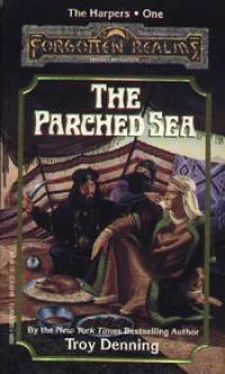

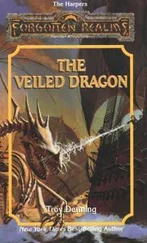

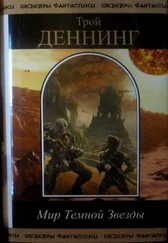
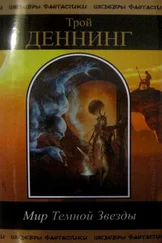
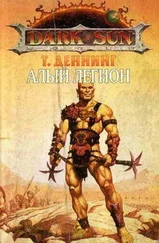
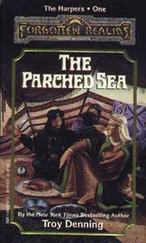



![Трой Деннинг - Тихая буря [litres]](/books/391050/troj-denning-tihaya-burya-litres-thumb.webp)